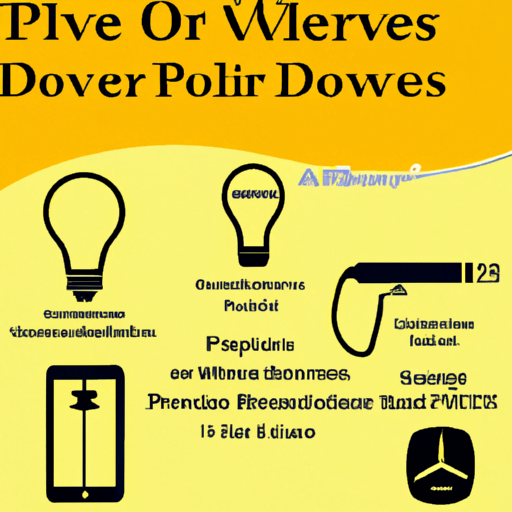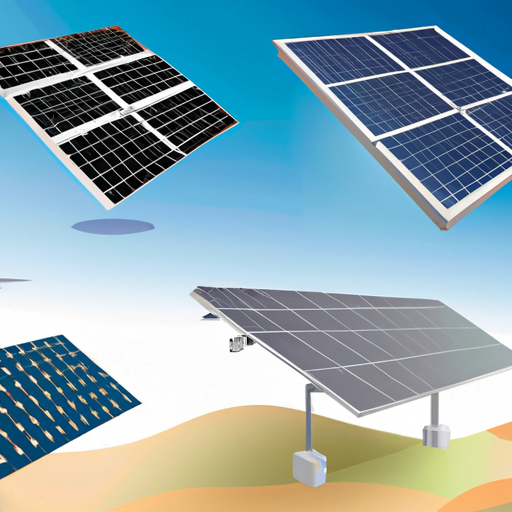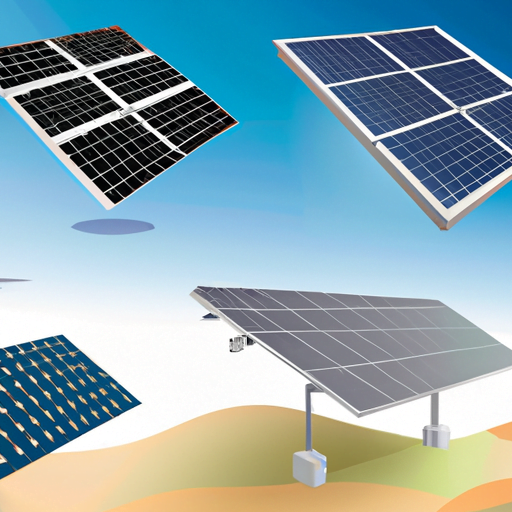So, have you ever thought about living off the grid? It’s definitely a tempting idea, being self-sufficient and all. But then you start wondering, what can you actually power with just 100 watts of solar energy? Well, I’ve got some good news for you – quite a lot, actually! Let’s dive into the world of practical devices that can be powered by this much solar energy.
First up, we have some essentials for everyday living. With 100 watts, you can easily power your lights and fans, keeping you cool and illuminated during those hot summer nights. And if you’re a fan of appliances, fear not! You can run small kitchen appliances like blenders, toasters, and even refrigerators, although you might have to be mindful of the energy consumption.
Moving on, let’s not forget about entertainment. With 100 watts, you can power your TV, stereo system, and even charge your gadgets. So, no need to miss out on your favorite shows or songs while living off the grid. And if you like to explore the great outdoors, you can also power camping essentials like portable speakers and LED lanterns – making those nights under the stars even more memorable.
But wait, there’s more! Have you ever considered having a portable power station? With 100 watts, you can have one of those bad boys to charge up your laptops, cameras, and even medical devices if needed. It’s like having your very own power source wherever you go. And don’t worry about the sun disappearing – you can even charge your 100-watt solar panels during the day to use the stored energy at night.
So, as you can see, 100 watts of solar energy can go a long way. In this article, we’ll dive even deeper into the devices you can power and how to make the most out of this sustainable energy source. Get ready to embrace off-grid living and discover the practical wonders of solar power!

Introduction
Living off the grid and harnessing the power of solar energy has become a popular and sustainable choice for many individuals and households around the world. By disconnecting from the traditional electrical grid and relying solely on solar energy, you can not only reduce your carbon footprint but also enjoy the benefits of energy independence. In this article, we will explore the various practical devices that can be powered by 100 watts of solar energy, providing you with the necessary information to make the switch and embrace a greener future.
Living off the grid with solar energy
What does it mean to live off the grid?
Living off the grid means relying on self-sustainability and renewable energy sources rather than being connected to traditional utility services. By generating your own power, you can free yourself from dependency on the electrical grid, reduce utility costs, and have a sense of control over your energy consumption.
Benefits of living off the grid
Living off the grid offers several benefits, including reduced utility costs, energy independence, and increased self-sufficiency. By harnessing solar energy, you can power your home or personal devices without relying on traditional fossil fuel-powered electricity. This not only saves money in the long run but also gives you peace of mind knowing that your energy consumption is sustainable and environmentally friendly.
Challenges of living off the grid
While living off the grid has many benefits, it’s important to be aware of the challenges that come with it. One of the main challenges is the initial cost of setting up a solar power system. However, with advancements in technology and decreasing prices of solar panels, these costs are becoming more affordable.
Another challenge is the need for efficient energy management. Since you are solely relying on the energy generated by your solar panels, it’s crucial to be mindful of your energy consumption and make smart choices to ensure you have enough power to meet your needs.
How solar energy can support off-grid living
Solar energy is an ideal choice for off-grid living because it is a clean, sustainable, and renewable energy source. By installing solar panels and a battery storage system, you can generate and store electricity during the day to power your devices at night or during periods of low sunlight.
Devices that can be powered by 100 watts of solar energy
Understanding power consumption
Before diving into the devices that can be powered by 100 watts of solar energy, it’s important to understand power consumption. In simple terms, power consumption is the amount of electricity a device requires to operate.
Calculating power requirements
To determine if a device can be powered by 100 watts of solar energy, you need to calculate its power requirements. Most devices indicate their power consumption in watts on their labels or in their specifications. To calculate the power requirement in watt-hours, you multiply the power consumption by the number of hours the device is in use.
For example, if a device consumes 20 watts of power and is used for 5 hours a day, the total power requirement would be 100 watt-hours (20 watts x 5 hours).
Examples of practical devices
Now that we understand power consumption and how to calculate power requirements, let’s explore some practical devices that can be powered by 100 watts of solar energy:
1. LED Lights
LED lights are extremely energy-efficient and can be powered by a small solar panel system. With 100 watts of solar energy, you can easily power several LED lights in your home or outdoor spaces.
2. Mobile Phones and Tablets
Charging your mobile phones and tablets with solar power is not only convenient but also reduces your reliance on grid electricity. A 100-watt solar panel can easily charge multiple devices throughout the day.
3. Laptop or Desktop Computer
Working or studying from home becomes easier when you have a reliable power source. A 100-watt solar panel can power a laptop or desktop computer for several hours, allowing you to work or study without interruptions.
4. Small Appliances
Small appliances like blenders, electric kettles, or toasters can also be powered by 100 watts of solar energy. However, it’s important to be mindful of the power consumption of each appliance and adjust your usage accordingly.
5. Camping Equipment
If you enjoy outdoor activities or camping, powering your camping equipment such as portable refrigerators, fans, or even small TVs with solar energy is an excellent choice. A 100-watt solar panel can provide enough power to keep your camping experience comfortable and convenient.
6. Fans and Ventilation
During hot summer days, having a solar-powered fan or ventilation system can provide much-needed relief. With 100 watts of solar energy, you can keep the air circulating and maintain a comfortable temperature indoors or in your vehicle.
7. Radios and Music Players
Listening to your favorite music or staying updated with the latest news doesn’t have to rely on grid electricity. A 100-watt solar panel can power radios and music players, allowing you to enjoy your entertainment devices even in remote locations.
8. Security Cameras
Security is a top priority for many homeowners, and solar energy can provide a reliable power source for security cameras. With 100 watts of solar energy, you can power multiple cameras to keep your property secure.
9. Water Pump or Filtration System
For those living in rural areas or off-grid locations, having access to clean water is crucial. A 100-watt solar panel can power a small water pump or filtration system, ensuring a constant supply of clean water without relying on external power sources.
10. Electric Fence
If you have livestock or a large property, an electric fence powered by solar energy is an effective way to keep animals contained. A 100-watt solar panel can provide enough power to keep the electric fence operational throughout the day and night.
Considerations for using multiple devices simultaneously
It’s important to note that when using multiple devices simultaneously, the power requirement increases. Therefore, it’s essential to carefully calculate the power requirements of each device and ensure your solar panel system can meet the demand.

Installation and setup
Choosing the right solar panels
When setting up a solar panel system, choosing the right solar panels is crucial. Look for panels that are highly efficient and reliable, as this will directly impact the performance and output of your system.
Sizing the solar panel system
The size of your solar panel system depends on your power requirements and the amount of sunlight available in your location. To determine the size of your system, calculate the total power requirements of your devices and choose a solar panel system that can generate enough electricity to meet those needs.
Batteries and storage capacity
To store excess solar energy generated during the day for use at night or during cloudy periods, you will need a battery storage system. The size of your battery capacity should be determined by your power requirements and the duration you want to rely on stored energy.
Inverters and converters
Inverters and converters are essential components of a solar energy system. Inverters convert the direct current (DC) electricity generated by the solar panels into alternating current (AC) electricity, which is what most household devices use. Converters, on the other hand, allow you to charge devices that require DC power directly.
Wiring and connections
Proper wiring and connections are crucial for the efficient functioning of your solar panel system. It’s important to follow the manufacturer’s guidelines and ensure that the wiring is suitable for outdoor use and capable of handling the power requirements of your system.
Mounting and positioning the solar panels
The positioning and mounting of your solar panels play a significant role in their efficiency. To maximize the sunlight exposure, install the solar panels in a location where they receive direct sunlight for the majority of the day.
Maintenance and upkeep
Regular maintenance is necessary to ensure the optimal performance and longevity of your solar panel system. This includes cleaning the panels, checking for any damages or loose connections, and monitoring the battery storage system. By keeping your system well-maintained, you can maximize its efficiency and lifespan.
Cost considerations
Price of solar panels
The cost of solar panels varies depending on factors such as the brand, size, and efficiency. Generally, the price of solar panels has been decreasing over the years, making them more affordable for homeowners.
Additional equipment and accessories
In addition to solar panels, you will also need to consider the cost of additional equipment and accessories such as batteries, inverters, mounting brackets, and wiring. These costs may vary depending on the size and complexity of your solar panel system.
Installation costs
Unless you have the necessary skills and knowledge, it’s recommended to hire a professional to install your solar panel system. The installation costs will vary depending on the complexity of the system and the labor required.
Return on investment
While the initial cost of setting up a solar panel system may seem high, it’s important to consider the long-term return on investment. By reducing or eliminating your monthly utility bills, you can save a significant amount of money over the lifespan of your solar panel system.
Government incentives and rebates
Many governments offer incentives and rebates for installing solar panel systems. These incentives can help offset the initial cost and make solar energy more accessible and affordable for homeowners.
Long-term savings
One of the main advantages of using solar energy is the long-term savings it offers. By generating your own electricity, you can significantly reduce or eliminate your dependency on grid electricity, resulting in substantial savings over time.
Environmental impact
Reduced carbon footprint
One of the most significant benefits of using solar energy is the reduction in carbon emissions. Unlike fossil fuel-powered electricity, solar energy produces zero greenhouse gas emissions, helping to combat climate change and reduce your carbon footprint.
Decreased reliance on fossil fuels
By generating your own clean and renewable energy, you are no longer reliant on traditional fossil fuel-powered electricity. This reduces the demand for and consumption of non-renewable resources, contributing to a more sustainable future.
Renewable and clean energy source
Solar energy is a renewable and clean energy source that relies on the power of the sun. As long as the sun shines, we can harness its energy without depleting natural resources or causing harm to the environment.
Supporting sustainable practices
Using solar energy is a tangible way to support sustainable practices and reduce our impact on the environment. By embracing solar power, you are promoting the use of renewable energy and encouraging others to do the same.
Contributions to a greener future
Switching to solar power is a small but important step towards a greener future. By collectively reducing our reliance on fossil fuels and embracing renewable energy sources like solar, we can create a cleaner, healthier planet for future generations.
Common concerns and misconceptions
Limited power generation
While it’s true that solar energy is dependent on sunlight, advancements in solar panel technology have increased their efficiency and power generation. Additionally, battery storage systems allow you to store excess solar energy for use during periods of low sunlight.
Shortage of sunlight
While sunlight availability varies depending on the location and season, solar panels can still generate electricity even on cloudy days. While the power generation may be slightly lower, you can still rely on solar energy for your power needs.
Battery storage limitations
Battery storage systems have made significant advancements, allowing for efficient storage of excess solar energy. By choosing the right battery capacity for your needs, you can ensure a continuous power supply even when sunlight is limited.
Affordability and accessibility
Solar energy has become more affordable and accessible in recent years. The decreasing cost of solar panels, government incentives, and financing options make solar energy a viable option for many homeowners.
Maintenance and reliability
While solar panel systems require some level of maintenance, they are generally reliable and have a lifespan of 25+ years. Routine cleaning and inspections can help ensure optimal performance and longevity.
Compatibility with existing electrical systems
Solar panel systems can be integrated with existing electrical systems, allowing you to power specific devices or your entire home. By working with a professional installer, you can ensure compatibility and a seamless integration of your solar panel system.
Tips for maximizing solar energy usage
Energy-saving practices
Adopting energy-saving practices such as turning off lights when not in use, using energy-efficient appliances, and insulating your home can help reduce your overall energy consumption and maximize the usage of solar power.
Efficient device selection
Choosing devices with low power consumption or using energy-efficient versions can significantly impact your solar power usage. When purchasing new devices, look for energy-efficient models that will minimize your energy requirements.
Conscious power consumption
Being mindful of your power consumption habits can help you make the most of your solar energy system. Avoid leaving devices on stand-by, unplug chargers when not in use, and prioritize the usage of energy-efficient appliances.
Optimal solar panel positioning
Properly positioning your solar panels ensures maximum exposure to sunlight and optimizes power generation. Take into consideration the angle, tilt, and orientation of your panels to capture as much sunlight as possible throughout the day.
Regular system monitoring
Regularly monitoring your solar panel system allows you to identify any issues or inefficiencies in real-time. By staying proactive, you can address any maintenance or performance-related concerns promptly.
Backup power alternatives
While solar energy is reliable, it’s always good to have backup power alternatives in case of unexpected situations. This can include having a generator or access to grid electricity as a last resort.
Future trends and advancements
Increasing efficiency of solar panels
Advancements in solar panel technology continue to focus on increasing their efficiency. This means that future solar panels will be able to generate more electricity with a smaller surface area, making them even more compact and efficient.
Advances in battery technology
Battery technology is constantly evolving, and advancements will continue to increase energy storage capacity and efficiency. This will allow for longer periods of stored energy and better utilization of solar power during periods of low sunlight.
Integration with smart home systems
The integration of solar energy with smart home systems is a growing trend. This allows homeowners to monitor and optimize their energy consumption, maximize the efficiency of their solar panel system, and further reduce their energy costs.
Internet of Things (IoT) applications
The Internet of Things (IoT) is being increasingly utilized in solar energy systems. IoT devices can monitor energy usage, provide real-time feedback, and automate certain functions, making solar energy systems more intelligent and efficient.
Solar energy on a larger scale
While this article focuses on powering practical devices with 100 watts of solar energy, large-scale solar energy systems are also becoming more prevalent. Solar farms can generate massive amounts of electricity, providing clean energy to entire communities or even cities.
Exploring alternative renewable energy sources
While solar energy is a popular and accessible renewable energy source, researchers and innovators are constantly exploring other alternatives. These include wind energy, hydroelectric power, geothermal energy, and bioenergy, to diversify and expand the options for sustainable energy.
Conclusion
In conclusion, harnessing the power of solar energy and living off the grid offers numerous benefits, including energy independence, reduced reliance on fossil fuels, and a positive impact on the environment. By understanding power consumption, choosing the right devices, and properly setting up a solar panel system, you can power a variety of practical devices with just 100 watts of solar energy.
While there may be challenges and misconceptions, the long-term savings, environmental benefits, and overall sustainability make solar energy a worthwhile investment. By embracing solar energy, you not only contribute to a greener future but also inspire others to make sustainable energy choices. So take the leap and power your life with 100 watts of solar energy – it’s a practical and impactful choice for a brighter future.





